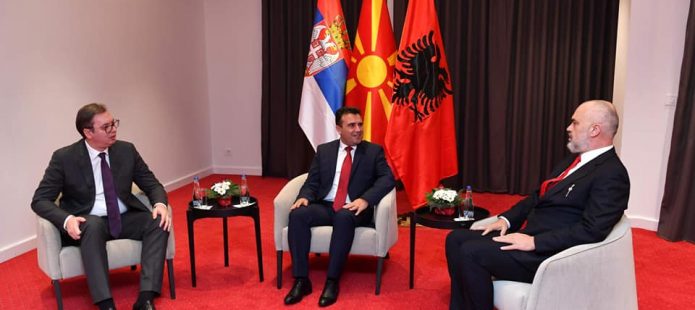

 Prime Ministers of Albania and North Macedonia, Edi Rama and Zoran Zaev and Serbian counterpart Aleksandar Vucic in Ohrid on Sunday, November 10. Photo: Office of the Prime Minister, Zoran Zaev.
Prime Ministers of Albania and North Macedonia, Edi Rama and Zoran Zaev and Serbian counterpart Aleksandar Vucic in Ohrid on Sunday, November 10. Photo: Office of the Prime Minister, Zoran Zaev.
Kosovo politicians have denounced plans made between Albanian, Serbian and North Macedonian leaders for a future small-scale Balkan version of the Schengen agreement, which would lift barriers to the free movement of people, goods and services.
The Prime Ministers of Albania and North Macedonia, Edi Rama and Zoran Zaev, and Serbian President Aleksandar Vucic made further steps towards the establishment of the so-called Balkan ‘mini Schengen’ project at a meeting in Ohrid, North Macedonia on Sunday.
Speaking to reporters after the meeting, Zaev stated that the proposals agreed upon at the meeting contain measures on the freedom of movement of people, goods and services and the exchange of students between the countries. The proposals are expected to be implemented following the adoption of an action plan, while the entire ‘mini Schengen’ project is expected to become operational in 2021.
When the three leaders signed a ‘declaration of intent’ to establish the ‘mini Schengen’ at a meeting held in Novi Sad in October, it was stressed that the initiative was also open to the three remaining members of the so-called ‘Western Balkans six:’ Kosovo, Montenegro, Bosnia and Herzegovina.
Montenegro’s Minister of Economy, Dragica Sekulic, and the Chairman of the Council of Ministers from Bosnia and Herzegovina, Denis Zvizdic, were also present at the meeting in Ohrid, though Sekulic later dismissed the idea of Montenegro joining the mini Schengen zone. No representative from Kosovo attended the summit in Ohrid, with Kosovo President Hashim Thaci refusing to accept the invitation to participate.
“Kosovo is committed to good neighborly relations and removing obstacles to the freedom of movement of people and goods, but Kosovo cannot be part of a summit in which countries that do not yet recognize the reality of an independent Kosovo participate,” Thaci said via Facebook. “We do not want to replace our Euro-Atlantic perspective with any regional perspective, in any circumstances.”
Representatives from the two parties expected to form Kosovo’s next government, Vetevendosje and the Democratic League of Kosovo, LDK, have also both expressed reservations about the project.
Speaking to Albanian media, head of Vetevendosje Albin Kurti played down the talks, describing Montenegrin and Bosnian representation as “symbolic” and stating that the meeting should have been postponed. Kurti also urged officials in Tirana to first remove barriers between Albania and Kosovo before “hurrying” into the mini Schengen agreement.
Head of LDK Isa Mustafa also criticized the idea. “At first glance they seem like attractive proposals, but in essence they lead to a new Yugoslavia, with Albania but without Croatia and Slovenia,” Mustafa said in a Facebook post. “They are ideas that we have not supported during our time in government [2015-2017], and we as the Democratic League of Kosovo will not support them, neither in government nor as part of the opposition.”
With Kosovo in a period of limbo between the dissolution of the previous Kosovo Assembly and the establishment of a new government, executive director of the union of Kosovo civil society organizations, CiviKos, Donika Emini suggests it would be beneficial for Kosovo to delay any possible involvement.
“Kosovo should not hurry down this path,” Emini said. “There is time before the next meeting or even next year, once the idea, the purpose, the political stances of EU countries and the new structure of the EU are clarified.”
Emini added that the model suggested in Novi Sad and Ohrid is difficult to apply, considering relations between Kosovo and Serbia and Bosnia and Herzegovina.
“This model works for a region where states recognize each other,” she said. “This does not currently appear to be on the horizon in the Balkans, especially with Serbia and Bosnia and Herzegovina reluctant to soften their approach toward Kosovo. An agreement like this should happen in very clear circumstances, when Kosovo is considered equal to all countries in the region politically.”
According to Emini, with Serbia leading the proposals, there is a difference between Kosovo’s participation in the Ohrid proposal and that of the Berlin Process – a series of meetings first conceived in 2014 similarly aimed at bolstering economic ties and fostering cooperation between the Western Balkans six and involved EU member states.
“The only difference in this regard is the ownership of the process,” said Emini. “An initiative that comes from [German Chancellor Angela] Merkel is very different from one that comes from a state that does not recognize Kosovo, and considers its borders to be with Albania – and not with Kosovo – in all its official documents.”
The next meeting scheduled to discuss the project will be held in Durres, Albania on December 21.
13 November 2019 - 15:25

A BIRN report found that the Western Balkans and Turkey have moved clo...

At a time when lies can be fabricated in seconds and politics can be m...

Kremlin-aligned actors are exploiting instability in the Western Balka...

The second day of BIRN’s conference dedicated to digital rights and ...